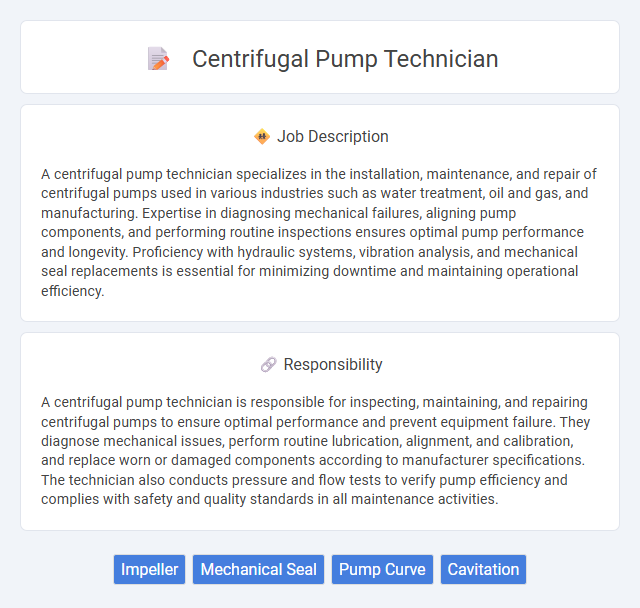
A centrifugal pump technician specializes in the installation, maintenance, and repair of centrifugal pumps used in various industries such as water treatment, oil and gas, and manufacturing. Expertise in diagnosing mechanical failures, aligning pump components, and performing routine inspections ensures optimal pump performance and longevity. Proficiency with hydraulic systems, vibration analysis, and mechanical seal replacements is essential for minimizing downtime and maintaining operational efficiency.
Individuals with strong mechanical aptitude and problem-solving skills are likely to be suitable for a centrifugal pump technician job. Those comfortable with hands-on work, troubleshooting complex machinery, and working in industrial or manufacturing environments may find this role fitting. However, people with certain physical limitations or a preference for desk-based work might face challenges in this position.
Qualification
A centrifugal pump technician typically requires a high school diploma or equivalent, complemented by vocational training or an associate degree in mechanical engineering or industrial maintenance. Proficiency in hydraulic systems, mechanical repairs, and familiarity with pump components and diagnostics is essential. Certification from recognized bodies such as the Hydraulic Institute or relevant industry-specific training enhances job prospects and skill validation.
Responsibility
A centrifugal pump technician is responsible for inspecting, maintaining, and repairing centrifugal pumps to ensure optimal performance and prevent equipment failure. They diagnose mechanical issues, perform routine lubrication, alignment, and calibration, and replace worn or damaged components according to manufacturer specifications. The technician also conducts pressure and flow tests to verify pump efficiency and complies with safety and quality standards in all maintenance activities.
Benefit
A Centrifugal Pump Technician likely gains valuable hands-on experience with complex mechanical systems, enhancing technical skills and problem-solving abilities. The role probably offers steady employment opportunities in industries such as water treatment, manufacturing, and oil and gas, which can contribute to job stability and career growth. Working in this field may also provide competitive wages and potential benefits, including health insurance and retirement plans.
Challenge
The role of a centrifugal pump technician likely involves troubleshooting complex mechanical and hydraulic systems that require precision and expertise. Challenges may arise from diagnosing irregular performance issues under varying operational conditions, demanding advanced problem-solving skills. Maintenance and repair tasks could often require working in high-pressure environments, increasing the difficulty level of the job.
Career Advancement
A centrifugal pump technician gains specialized skills in installing, maintaining, and troubleshooting pump systems critical for industries like oil, gas, and water treatment. Mastery in hydraulic principles, mechanical seal replacement, and pump alignment drives eligibility for senior technician and supervisory roles. Continuous education and certification in advanced pump technologies enhance career advancement opportunities and salary prospects.
Key Terms
Impeller
A centrifugal pump technician specializes in inspecting, maintaining, and repairing impellers to ensure optimal pump performance and efficiency. Precise balancing of the impeller minimizes vibration and wear, extending the pump's operational lifespan. Expertise in material selection and impeller design allows the technician to address issues related to cavitation, corrosion, and flow capacity.
Mechanical Seal
A centrifugal pump technician specializing in mechanical seals ensures the integrity and performance of pumps by inspecting, installing, and maintaining advanced seal components that prevent fluid leakage. Expertise in troubleshooting seal failures, selecting appropriate seal materials, and performing precise alignment improves pump reliability and reduces downtime. Mastery of mechanical seal technology is crucial for optimizing centrifugal pump efficiency in industrial applications.
Pump Curve
A centrifugal pump technician specializes in interpreting and analyzing pump curves to optimize pump performance and efficiency. Understanding the pump curve helps in diagnosing issues related to flow rate, head, and power consumption, enabling precise adjustments and maintenance. Mastery of pump curves ensures accurate troubleshooting and prolongs equipment lifespan in industrial settings.
Cavitation
A centrifugal pump technician specializes in diagnosing and resolving cavitation issues that cause performance loss, noise, and potential damage to the pump impeller and casing. Cavitation occurs when vapor bubbles form in the pump due to low pressure, leading to shock waves that erode metal surfaces and reduce pump efficiency. Expertise in monitoring suction conditions, maintaining optimal Net Positive Suction Head (NPSH), and selecting appropriate impeller designs is essential for preventing cavitation and ensuring reliable pump operation.
 kuljobs.com
kuljobs.com